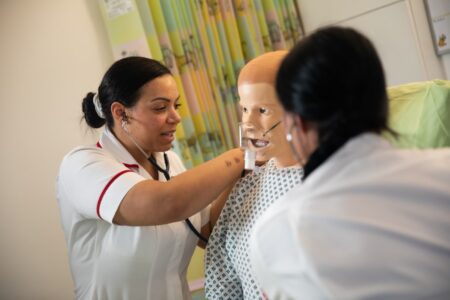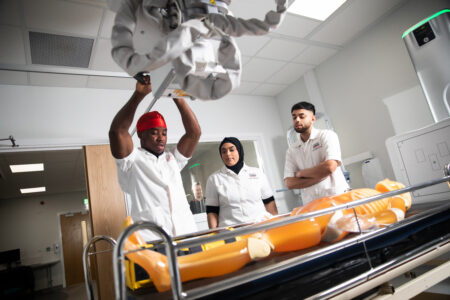Leaving behind a stable corporate career is never easy, but that was the step Wing Ki knew she had to take. Although she was a Senior Key Account Associate in a global biopharmaceutical company in Hong Kong, she sought something more than professional success. She wanted to make a difference in people’s lives.
That search for purpose would lead her to the University of Salford’s School of Health and Society.
After exploring different options and weighing her choices carefully, she found the MSc in Occupational Therapy the most appealing. It had a strong reputation and came from one of the largest providers of health education in the UK, with close links to hospitals and community services.
“The programme is accredited and highly reputable, offering students abundant placement opportunities within the Greater Manchester area to work across a wide spectrum of specialities in different settings,” she says. “I was confident that I would be equipped with the professional knowledge, skills, and attributes needed to support service users in participating in meaningful occupations.”
@uos_health_society Find out how we support occupational therapy student to prepare for the world outside the University ✨ • #knowledgeispower #studentslife #campuslife #campusfavourites #universityofsalford #occupationaltherapy
That confidence soon became reality. Within a month of graduating, she secured her dream role. “After two years of hard work and dedication, I’m now a Paediatric Occupational Therapist supporting children with special educational needs to maximise their full potential through client-centred, holistic, and compassionate care, while also offering essential support to parents and teachers,” she says.
Her story is just one example of how Salford helps international students transform ambition into career success through a focus on real-world impact.
New facility to revolutionise teaching, same legacy of excellence
The school offers several master’s programmes in healthcare, psychology and sport. These include the MSc Clinical Exercise Physiology, MSc Podiatry, MSc Public Health, MSc in Occupational Therapy (pre-registration), and MSc Forensic Psychology.
They have long emphasised on learning that extends far beyond lecture halls, reaching communities in Vietnam, Uganda, Ghana, and beyond, as students and researchers work with leading organisations to tackle healthcare challenges at scale.
And they have always equipped graduates to shape policy, transform practice, and drive change in healthcare systems worldwide.
Soon, the school will welcome another game-changing hub: a new Health Building set to transform allied health teaching.
Located on the Frederick Road campus, this health and wellbeing hub will blend innovation, community focus, and real-world practice. Inside, it will host in-demand courses such as podiatry, sports and occupational therapy. Plans include industry partnerships to deliver public services directly from the building — think mother and child health sessions, weight management clinics, and wellbeing forums. For students, that means hands-on experience without even leaving campus.
Scheduled to open in October 2026, the building will meet BREEAM Excellent and WELL Gold standards, setting a new benchmark for sustainable, health-focused learning spaces. A light-filled atrium, indoor planting, and rooftop terraces will create a thriving environment. Flexible spaces will support both collaboration and quiet study.
MSc Clinical Exercise Physiology will benefit directly from access to new labs, including a clinical rehabilitation suite, an adjunct rehabilitation gym, and a laboratory focused on kinetic and kinematic analysis of human movement. Meanwhile, MSc Podiatry students will be able to complete practical placement hours in a fully functioning on-site podiatry clinic, guided and supported by experienced tutors.
The new building is the latest addition to the school’s long list of state-of-the-art facilities and experiential learning opportunities. For example, MSc Public Health students can work on external or internal applied research projects as part of their dissertation and visit plague village Eyam on a field trip to explore how plague containment strategies inform public health today. MSc Forensic Psychology students benefit from a varied calendar of expert guest lecturers, partnership with a 90-bed NHS-contracted mental health facility, and time in an industry-standard psychology lab, which includes equipment such as eye trackers, functional near infrared spectroscopy, an observation suite with a two way mirror, video game analysis lab, and a dedicated computer lab with a range of psychological software.

The School of Health and Society has expanded its courses and programmes to better meet the evolving needs of the industry. Source: University of Salford
Discovery and breakthroughs are part of the curriculum
Courses are just as informed by the latest research as they are experiential. The university is proud of fusing real-world experience with cutting-edge research in its pursuit of meaningful impact.
Take the Kidney Information Network, for example, which is creating new models to support patients with chronic kidney disease — frameworks with the potential to be adapted for other chronic illnesses. Or, in Uganda, where amputations are more common due to road traffic accidents and conflict, the school is advancing prosthetic and orthotic services in areas where infrastructure is scarce.
Being part of this innovative ecosystem can be life-changing. It was for Charlton Ebomah, who completed an MSc in Clinical Exercise Physiology. “The incorporation of the simulation suites in the course helps you put your learnings into practice in a safe and supportive environment,” he says.
The result? He secured his first job offer within three months and earned his BACPR qualification within a year. “This has opened doors for me as a cardiac rehab exercise physiologist at the Wirral Community Health and Care NHS Foundation Trust,” he says. “Studying at Salford was a life-changing, foundation-building experience for me. The lessons learned and skills gained will be the basis of many future career decisions.”
Learn more about University of Salford’s School of Health and Society.
Follow the University of Salford on Facebook, Instagram, LinkedIn, TikTok , and YouTube













